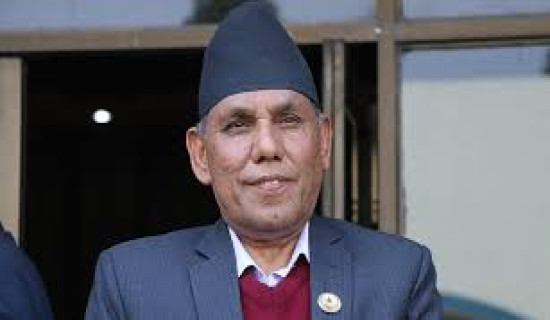- Tuesday, 21 October 2025
Significance Of AI In Healthcare
Rastra Dhoj Karki
Artificial Intelligence is a new field of technology that has caught the attention of many people, such as experts in technology, doctors, entrepreneurs, data scientists, and many more. Well, it is not surprising because of the capability of this technology.
Training an AI model with sufficient accurate data concerning the problem it is about to solve provides a general solution to that problem.
What is Healthcare?
Before diving into AI in Healthcare, it is necessary to understand healthcare. Health defines the state of a person, physical and psychological. The absence of disease does not mean a person is healthy. They should have a good lifestyle, social well-being, positive outlook, and other good qualities. Healthcare is preserving this state that comes in different forms for various problems, which depend on the person.
The problem may vary from obesity, physical wounds, depression, unhealthy diet, illness, and more.
Healthcare is not something that can be delivered, purchased, or marketed but rather a complex ecosystem with several moving pieces linked by the patients' presence. The fundamental purpose of health care is to enhance the quality of life by improving health. Commercial businesses focus on creating financial profit to support their valuation and remain viable.
Health care must develop social profit to fulfil its promise to society. People have a right to pick the environment that best meets their wants, even though they need good health. Health organizations must make access to adequate healthcare available to all their members, regardless of their ability to pay.
People are far more in danger when they lack access to healthcare. Without the proper assistance and care, illnesses, starvation, and pregnancy can all escalate to dangerous levels.
In Healthcare, AI is changing the game with decision support, image analysis, and patient triage. AI can also sense abnormalities or problems in the human body which go unnoticed by the naked eye. Because AI has plenty of computational power, it can compute a vast amount of data within a reasonable time to conclude. It can reach decisions within split seconds, which is critical when lives are at stake. AI technology extracts the uncertainty from viewing patient scans by highlighting problem areas on images, aiding the diagnosis process.
AI also helps reduce stress on physicians as chatbots ask patients about their symptoms and collect patient data that helps to diagnose. This process saved both time and money for both parties.
Why does AI play a vital role in healthcare? It's mainly because of human limitations and available resources. The primary reasons are that doctors are scarce to manage the flow of patients, the burnout and ageing of existing doctors, and the demand for treatment. By introducing AI, the workload can decrease to help doctors in their job.
Takayuki Morita, President and CEO (Representative Director) of NEC Corporation, talked about storing gene information in computers in the show Tech Transformers. Therefore, it can help doctors to study data that was not available earlier to analyse problems more in-depth.
AI Creates Medicines
Moreover, Kai-Fu Lee (The chairman & CEO of Synovation Ventures) says that human doctors neither have a complete inventory of data nor can keep up with it. Thus, AI applications in every aspect of medicine. He also mentioned that diagnosis with AI in radiology and pathology is better than doctors in specific illnesses.
AI also helped create drugs that cured Pulmonary Fibrosis and Kidney Fibrosis. AI can perform well provided it has enough data, although privacy is affected in the process.
Privacy has always been an influential element in our lives, especially when data comes into play. The data needed for AI to train for high accuracy has a risk of privacy leaks. The solution to this problem is to keep parties in the data anonymous and only train the AI on values provided by the data. Another solution would be for hospitals to install AI locally to train on hospital data. A trained AI model does not store private information, only the weights.
Here are some achievements AI has acquired in healthcare. A study published in the Annals of Oncology revealed that an AI model diagnoses cancer more accurately than a team of experts within that field. AI trained with images of skin cancer had achieved a 95% accuracy rate, whereas the experts had performed with 87% accuracy.
AI could minimize false positives (predicted values that are incorrect) when evaluating symptoms, which means fewer people undergo unnecessary treatments.
Another published paper from MindStrong-California shows that their technology could predict depression and other mental health disorders by analysing the usage of smartphones.
Furthermore, IBM is developing an AI system to assist radiologists by sifting through millions of images and comparing them to other data.The software is in an advanced stage of testing and preparation for commercial use.
The IBM team behind it is working to refine its accuracy. Currently, AI has reached the level of performing robotic surgeries semi-autonomously.
Doctors spend years training and learning all about the human body and the illnesses and diseases that can infect it. They also keep track of up-to-date research published in medical journals and medical development.
Robot doctors can help keep up with the information, and training their models takes less time because of the computational power. Looking at the time when Covid-19 hit the world, many countries shared information and vaccines with other nations, working together to fight the disease. If provided with similar data, maybe on a smaller scale it would benefit the people. Rules and regulations also affect acquiring data, although to provide privacy makes this a case of sacrificing one for the other.
AI with high computation power has brought on the new concept of precision medicine. Also known as personalised medicine: it is a specific treatment for every individual, meaning that the treatment will work better on that individual than others, bringing about the digital revolution. Thorough treatment is not possible for every individual without AI because of burnout.
A few AI inspirational quotes:
"Machine Intelligence is the last invention humanity will ever need to make" - Nick Bostrom,
"Predicting the future isn't magic, it's Artificial Intelligence" - Dave Waters,
"You can have data without information, but you cannot have information without data" - Daniel Keys Moran.
The bold statements made above define what AI is capable of doing.
These companies are leading the world with AI in healthcare: Neuralink, Butterfly Networks, BioBeats, Nines, Arterys, Enlitic, Komodo Health, Qventus, Corti, Viz.ai, and Ezra. These companies have made outstanding AI products that assist in healthcare.
Healthcare will always need humans because robots cannot replace empathy. Even if every job in the industry undergoes replacement, there should be supervisors who operate them. Moreover, patients need emotional support, and doctors have methods that may be more efficient than a machine. It has never been machine vs. humans, but AI and humans work together for better results.
And now the question is, will AI replace the employment of many people working for their livelihood? There is no definite answer to this with the existing technology. But AI could replace around 85 million jobs worldwide in the coming years, which may sound uneasy, whereas creating 97 million new jobs.
It depends on the companies that use AI and keep humans in their workforce. The world is moving into a digitalised era; thus, it is necessary to stay up to date on technological advancements around the globe.
(Karki is currently pursuing higher education in computer software)
How did you feel after reading this news?









-original-thumb.jpg)




-original-thumb.jpg)

